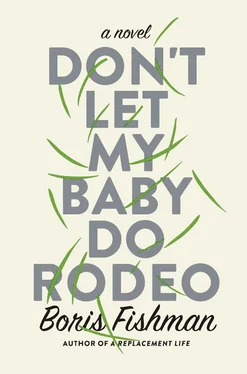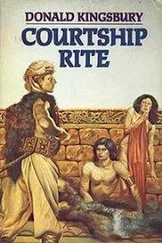Maya was speechless. She was within rights to censure him, but he knew that before he spoke, and since he had, anyway, she would not. A long silence ruled the telephone.
“But we are not supposed to know each other,” Maya said, enforcing a rule she hadn’t made.
“Yes, it’s not standard,” he said. “But there’s a lot of leeway built in. You know their first names already — you won’t know their last. You’ll see what they look like, of course, but they live two thousand miles away, you don’t know what town. Unless you go looking for them, I doubt it makes a difference in practice.”
“They’re not the only ones I am thinking about,” Maya said, defensive of her husband. “They will know where we live. What about that? The point of a closed adoption is it’s closed. This way, they can drop down on us whenever they wish! That’s not right. My husband will disagree. No, Mr. Mishkin, this won’t work.”
“Mrs. Rubin, you can say no. Tell me no, and we will go back to the original plan. Don’t worry about it.”
“Will the mother become upset because I said no?” Maya said. “Can she change her mind?”
“I have no idea, Mrs. Rubin. I have a hard time with Laurel even when I’m not guessing what’s in her mind. But the papers have been signed — that makes it a lot more difficult for her to change it. Mrs. Rubin — this girl is intent on finding her boy a new home. They’re eighteen — they can’t raise a child. They’re Christian, they don’t do abortions. They’re giving him up. They’re too young. You wanted to find out about the parents; you did, I know, even if your husband and your parents-in-law didn’t. So here they are. Here’s your chance.”
“She told you that?” Maya said hungrily. “She told you that was the reason? Too young?”
“No,” Mishkin said. “They do not have to explain.”
“Why,” Maya said helplessly. “Why. That is the most important thing. The very most important thing. It is the only thing they have to explain.”
“I don’t want to stray into psychological territory, but in life we must occasionally make peace with the fact that we simply won’t know. That is their right, not to say. However, if you allow them to come to you, you can ask them.”
Maya did not answer. On the other end, Mishkin took a deep breath. The conversation had become intimate. She hated him less.
“You can have this child tomorrow, Mrs. Rubin.” Mishkin said. “That is it at its plainest. Do you want to have this child tomorrow?”
“Tomorrow?” Maya said.
“You’re wondering why I’m phoning so late in the night,” Mishkin dared. “For which I’m sorry, by the way.” His tone was grave, and on hearing it, Maya discovered, with petrification, that she preferred the old, unserious Mishkin. “They’re harvesting right now, or something: I don’t really get it. They’ve only got the weekend, they need to get back. .”
“What is it?” Maya yelled, waking up Alex, who looked up reproachfully from the La-Z-Boy.
“They’re halfway to you already,” Mishkin said. “Now, don’t get upset, Mrs. Rubin, I just found out myself. I told you she’s impulsive. I tried to explain they had to get your okay, and, look, they’re not going to show up on your driveway, they don’t even know what town in New Jersey yet. But if you can live with this, Mrs. Rubin—”
The soup bubbled over, hissed the flames, stained the burner, slithered down the face of the oven until it disfigured the kitchen tile. Alex sprang from the recliner intending to halt the absurd progress events had made while he had allowed himself to drift off — he could not let down his guard even for thirty minutes on the backside of the day. But, seeing the wild look in his wife’s eyes, he had his first apprehension of the fact that within twenty-four hours he might be holding his son.
+
It was nearly dusk when the headlights of Laurel and Tim’s coffee-and-milk Datsun swept across the Rubins’ living room. The previous evening, Alex had been made to extract the ancient United States driving atlas the Rubins had been given by the resettlement agency when they’d arrived in America. It still held together — Alex rarely opened it. The cover depicted a dark-skinned man in jeans and Native American headdress hopping around a campfire, an Alaskan iceberg, tall buildings in New York, and a curvaceous brown river.
If they were from Montana, and they were halfway to the Rubins at ten o’clock on Friday evening, when would they reach Acrewood, New Jersey? Maya was returned to the algebra classes of her youth: If Comrade So-and-So’s train starts at Point A at eleven o’clock. . “Maya, don’t be silly,” Alex said. “Do they stop for the night or do they keep driving? How long do they sleep? It’s not possible to answer. Don’t panic. When they come, they come.” But his voice carried a tremulous note — as superiorly acquainted with America as Alex was, he was alarmed at the prospect of two people from Montana in his home. Three people.
She pushed the atlas at him and asked him to try. He pulled out a notepad and worked at it, finally announcing that Laurel and Tim would be in Acrewood at around seven P.M. the following day, depending.
“So I have to make dinner.”
“You don’t have to make dinner.”
“You want to welcome these people with an empty table?” she said. She sank into a chair and covered her eyes. “This is absurd, every step of it.”
He laid his palms on her shoulders. “Maya, look at me,” he said. She did, because usually he didn’t produce effort of this kind. “We’ve been reading books for a year. We have enough diapers for our child to shit himself until college. This is what you wanted. Your son is coming.”
She began to whimper into her fist.
“Now this makes no sense,” Alex said.
“I made you do it,” she said.
“Did you?” he said. He stared at his hands on her shoulders. “It’s a dramatic experience, Maya, so it’s natural you would feel upset now. But it doesn’t mean you’re upset. You’re happy.” Maya rolled her head into her husband’s shoulder, and he pawed at it.
Maya did cook, if only out of anxiety; the dining table was filled with highlights of the Ukrainian kitchen: peppers marinated in buckwheat honey, lemon, and garlic; cabbage salad; and, for good luck, the grechanniki that Maya had made all those years before. The table also featured a Mishkin, who, for one, was glad Maya had cooked. When no one was looking, he thieved a disk from the plate of grechanniki , encountering the same problem Alex had all those years ago: It wasn’t possible to have just one. But he couldn’t have another — the Datsun bounced onto the driveway. The dense woodland of gray hair that crowned Mishkin’s heavy-jawed face doubled handily as a napkin for his oil-stained fingers — in her nervousness, Maya had forgot to lay out actual napkins. Mishkin looked like he was rubbing anxiety out of his scalp, which neatly aligned him with the Rubins. “Here come the cowboys,” Alex said mournfully. Gathered at the living room window, the Rubins could not see into the vehicle, though they believed they could be seen. For a moment, no one emerged.
“Must we open their doors and invite them in?” Alex said.
The two young people who eventually stepped out of the vehicle were shocking in their youthfulness. They were Maya’s age when she had come to America — was that how young she had looked then? The young woman, Laurel, wore a superfluously pleated yellow sundress under a turquoise blouse with buttons. She crouched before the passenger’s-side mirror, which showed her that her hair was unpresentable, and called out in a sharp, hoarse voice to her boyfriend to wait while she fixed. Tim, coming around the car, paused. He had a limp in his right leg and wore a baseball cap. Maya knew his eyes were blue without seeing them.
Читать дальше












